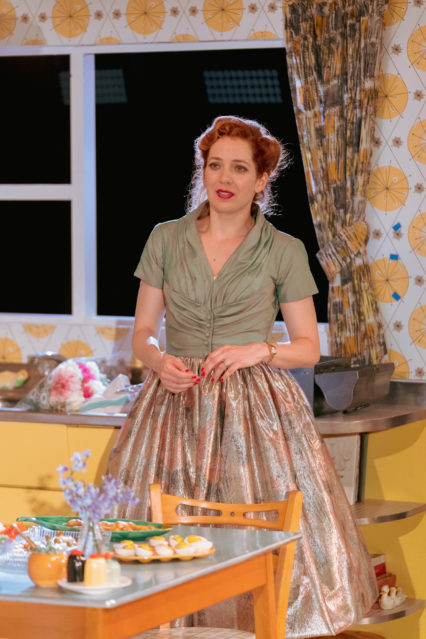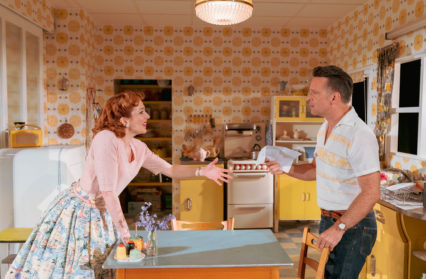Georgie Bolwell visitst Theatr Clwyd in Mold to review Laura Wade’s play Home, I’m Darling, a collaboration with National Theatre in England.
Laura Wade’s play, Home, I’m Darling, marks a momentous collaboration between Theatr Clwyd and the National Theatre in England. It begins its run in Mold, before transferring to London on July 24th, hopefully to meet with much audience anticipation. In Wales, it is performed in the smaller Emlyn Williams Theatre at Theatr Clwyd, the play benefits from this intimacy. A brilliantly funny piece, Wade’s script is handled with alacrity by the whole cast and was beautifully directed by Theatr Clwyd’s artistic director, Tamara Harvey.

Harvey, Wade, and lead actor Kathrine Parkinson have worked together before and this is evident in the easy way that the performance flows. Parkinson’s performance is fully realised, perhaps unsurprising since the role was written specifically for her; she sails across the stage with an effortless grace. Wade’s play provides an interesting comment on 1950s values and gender roles in marriage. With women as playwright, director, and lead, Home, I’m Darling arrives on stage at a propitious moment in our history. Following the ‘Time’s Up’ and ‘Me Too’ movements, which have exposed the systematic subjugation and exploitation of women in the film, television, and theatrical industries, this play puts women at the forefront, giving them the power that has so often been denied them.
The 1950s was a ‘simpler time’. Everyone knew their place, and for housewife Judy, that place is in the home she keeps for her husband. Their life is perfect – they are ‘disgracefully happy’ as Judy moves around the kitchen in morning preparing breakfast for the hard-working Johnny. With a sunny smile, she waves her husband off to work and returns to clean up the kitchen. Before she does though, she takes a brief seat to reflect on her tasks for the day, have a bite of toast, and check her emails. Judy is a modern woman who was offered voluntary redundancy and decided to take it in order that she could remain at home and ‘keep house’. Since she was a child, Judy has been fascinated with the 50s, and meeting Johnny, who also showed an interest in the era, solidified for her that the 50s were where she was meant to live her life. Their home is an homage to that decade despite the fact that, as Judy’s first-wave feminist mother points out acerbically, ‘the 50s didn’t look like this in the 50s!’ However, the lifestyle isn’t all it’s purported to be, and three years into their fantasy way of life, the cracks begin to show. As Judy and Johnny attempt to navigate the obstacles that spring up in their marriage, work life, and home, their friends, Fran and Marcus, grapple with an allegation of sexual harassment made against Marcus. An allegation that can’t be true, because it’s just a compliment, isn’t it? It’s just a friendly hug. A gentle pat. As the 50s fall down around Judy’s ears, a deeper question is raised about marriage, gender, and the issue of the choice that we are afforded in modern life.
Wade’s writing is skilful, striking a balance between humour and gravity that is so often lacking in modern comedies. She clearly presents the difficulties of attempting to preserve a certain type of lifestyle, while also needing to adapt with modern times in order to survive. What Judy calls a feminist choice to live a certain way is scrutinised throughout the play and slowly devolves into a manic desperation to maintain the way of life that has brought her marriage to a standstill. The slip back in time to the start of Judy and Johnny’s journey to the 50s is neatly handled with a malleable and shifting set and gives much-needed insight into the decisions made and the reasons for them. It is clear from this brief flashback that what started as a choice, made for the right reasons, has become a fetishisation of the past.
Richard Harrington, who excels in his role as loving, though exasperated, husband Johnny, repeatedly provides the voice of reason and honesty in the play. Johnny is most concerned with his and his wife’s happiness and falls neatly in between the obsessive Judy and the chauvinistic Marcus.
Johnny and Judy’s house, decorated in garish colours and bold prints in hyper-50s fashion, is displayed wide open with kitchen and living room on the ground floor and stairs up to a bedroom and bathroom. Though beautifully and cleverly presented, it is at times a little too busy, especially when there were scenes taking place in two rooms at once. Furthermore, there are places where scenes could have been cut shorter in favour of faster moving action.
Near the start of the play, Johnny makes a particularly poignant comment, which echoes throughout and highlights the futility of the whole exercise – ‘you can’t live a fifties lifestyle without the internet’. Home, I’m Darling not only asks whether living in the past is possible in the modern age, but also questions whether you should. Is making a choice to subjugate yourself – though Judy insists that she and her husband fulfil equal, but different, roles in their marriage – any better than being oppressed against your will? The overarching answer to that question, as presented in the play, is no. In fact, as Judy experiences, in doing so you not only also ostracise yourself from society, you also deride the blood, sweat, and tears of the women who fought for what we have today.
Home, I’m Darling is on at Theatr Clwyd, Mold until July 14th before moving to the National Theatre in London.











